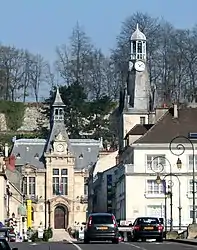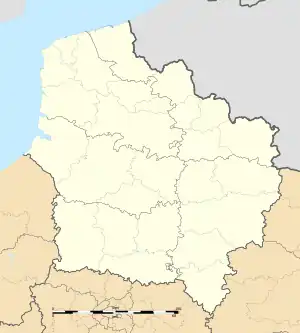Château-Thierry | |
|---|---|
Subprefecture | |
 Town hall | |
 Coat of arms | |
Location of Château-Thierry | |
 Château-Thierry  Château-Thierry | |
| Coordinates: 49°02′N 3°24′E / 49.04°N 3.40°E | |
| Country | France |
| Region | Hauts-de-France |
| Department | Aisne |
| Arrondissement | Château-Thierry |
| Canton | Château-Thierry |
| Intercommunality | CA Région de Château-Thierry |
| Government | |
| • Mayor (2020–2026) | Sébastien Eugène[1] (MRSL) |
| Area 1 | 16.55 km2 (6.39 sq mi) |
| Population | 15,204 |
| • Density | 920/km2 (2,400/sq mi) |
| Time zone | UTC+01:00 (CET) |
| • Summer (DST) | UTC+02:00 (CEST) |
| INSEE/Postal code | 02168 /02400 |
| Elevation | 59–222 m (194–728 ft) (avg. 63 m or 207 ft) |
| 1 French Land Register data, which excludes lakes, ponds, glaciers > 1 km2 (0.386 sq mi or 247 acres) and river estuaries. | |
Château-Thierry (French: [ʃɑto tjeʁi]; Picard: Catieu-Thierry) is a French commune situated in the department of the Aisne, in the administrative region of Hauts-de-France, and in the historic Province of Champagne.
The origin of the name of the town is unknown. The local tradition attributes it to Theuderic IV, the penultimate Merovingian king, who was imprisoned by Charles Martel, without a reliable source. Château-Thierry is the birthplace of Jean de La Fontaine and was the location of the First Battle of the Marne and Second Battle of the Marne. The arrondissement of Château-Thierry is called the country of Omois. Château-Thierry is one of 64 French towns to have received the Legion of Honour.
History
_-_Emplacement_d-une_Bertha_(pd).jpg.webp)

In the late years of the western Roman empire, a small town called Otmus was settled on a site where the Soissons-Troyes road crossed the Marne river. During the 8th century, Charles Martel kept king Theuderic IV prisoner in the castle of Otmus. At this time, the town took the name of Castrum Theodorici, later transformed in Château-Thierry (Castle of Thierry, Thierry is the French or early Roman language translation of Theuderic).
In 946, the castle of Château-Thierry was the home of Herbert le-Vieux, Count of Omois of the House of Vermandois and Soissons.[3]
Château-Thierry was the site of two important battles: the Battle of Château-Thierry (1814) in the Napoleonic Wars between France and Prussia, and the Battle of Château-Thierry (1918) in World War I between the United States and Germany.[4]
In 1918, a mounting for the Paris Gun was found near the castle, though the cannon itself had apparently been moved prior to the emplacement's discovery.[5]
Geography
Château-Thierry is situated on the river Marne, at 90 kilometres (56 mi) from Paris.

Transport
Château-Thierry station is the terminus station of a regional railway line starting from the Gare de l'Est in Paris. Furthermore, it has rail connections to Châlons-en-Champagne, Nancy and Strasbourg. It is also one of the exits of the A4 autoroute that links Paris with the east part of France. Transval operates the local bus routes.[6]
Personalities
Château-Thierry was the birthplace of:
- Walter of Château-Thierry (died 1249) a French theologian and scholastic philosopher.
- Samuel ben Solomon of Falaise 13th-century rabbi (one of the proponents of the Talmud during the Disputation of Paris).
- Jean de La Fontaine (1621–1695), a fabulist and poet, known best for his Fables.[7]
- Jean-Baptiste Dumangin (1744–1826), French physician who performed the autopsy of Louis XVII.
- Louis Jean-Baptiste Leseur (1774–1818), army general of the French First Republic and the First French Empire.
- Chevalier de Saint-Georges (1745–1799), a French Creole virtuoso violinist and composer
- Antoine Menant (1762-1829), army general of the French First Republic and the First French Empire, born in Lyon and died in Château-Thierry.
- Charles Martigue (1777-1825), cavalry colonel of the armies of the French First Republic and the First French Empire.
- Jean Macé (1815–1894), an educator, journalist, active freemason and politician.
- Maurice Holleaux (1861–1932), 19th– to 20th-century French historian, archaeologist and epigrapher.
- Jules Guiart (1870-1965), parasitologist and medical historian, was born in the city.
- Achille Jacopin (1874-1958), sculptor.
- François Aman-Jean (1894–1986) physician, surgeon, writer and playwright
- Teddy Roosevelt's son Quentin (1897–1918) was shot down while flying a French SPAD plane during WWI.
- Charles Schneider (1881-1953), glassworker.
- Ba Jin (1904–2005), a Chinese writer and intellectual, stayed here in 1927 and 1928.
- Auguste Jordan (1909-1990), Austrian professional footballer who played on the French national team.[8]
- Léon Hess, creator of the "Le Castel" gâteau du voyageur, who won a gold medal at the 1912 Exposition Culinaire Internationale in Paris.[9]
- Nadia Tagrine (1917-2003), pianist.
- Manu Dibango (1933–2020) a Cameroonian musician and songwriter
- Yves Bot (1947–2019), magistrate.
- Pierre Bensusan (born 1957) a French-Algerian acoustic guitarist.
- The novel The Greengage Summer (1958) of Rumer Godden (1907–1998) is set in Château-Thierry.
- and
- Sylvain Lévignac, actor and stuntman, died in Château-Thierry.
- Charles Ferton père.
- Edmond de Tillancourt.
- Charles-Armand de Rougé.
- Guillaume-Benoît Houdet.
Population
|
| ||||||||||||||||||||||||||||||||||||||||||||||||||||||||||||||||||||||||||||||||||||||||||||||||||||||||||||||||||
| Source: EHESS[10] and INSEE (1968-2017)[11] | |||||||||||||||||||||||||||||||||||||||||||||||||||||||||||||||||||||||||||||||||||||||||||||||||||||||||||||||||||
Sights
- Castle walls
- Saint-Crépin church (15th century)
- Balhan tower
- Marne River
- World War I Aisne-Marne American Cemetery and Memorial (south of the village of Belleau)
- Chateau-Thierry American Monument (overlooking the town)
- Champagne vineyards
- Several churches
Twin towns – sister cities
Château-Thierry is twinned with:[12]
 Cisnădie, Romania (1997)
Cisnădie, Romania (1997) Grybów (rural gmina), Poland
Grybów (rural gmina), Poland Mosbach, Germany (1974)
Mosbach, Germany (1974) Pößneck, Germany (1989)
Pößneck, Germany (1989)
See also
References
- ↑ "Répertoire national des élus: les maires" (in French). data.gouv.fr, Plateforme ouverte des données publiques françaises. 6 June 2023.
- ↑ "Populations légales 2021". The National Institute of Statistics and Economic Studies. 28 December 2023.
- ↑ "mycruisewebsite.co.uk". Archived from the original on 15 December 2017. Retrieved 15 December 2017.
- ↑ Warnes, Kathy. "In 1919, Villagers and soldiers helped rebuild chateau-thierry". Windows to World History. Archived from the original on 7 May 2016.
- ↑ Columbia Alumni News. Alumni Council of Columbia University (Vol. 10, No. 30). 1918. p. 937.
- ↑ "Archived copy" (PDF). Archived from the original (PDF) on 20 July 2011. Retrieved 22 August 2010.
{{cite web}}: CS1 maint: archived copy as title (link) - ↑ Saintsbury, George (1911). . Encyclopædia Britannica. Vol. 16 (11th ed.). pp. 69–71.
- ↑ "Auguste Jordan, un Autrichien sous le maillot tricolore au temps des années noires". wearefootball.org. Archived from the original on 1 November 2018. Retrieved 21 July 2014.
- ↑ ""Le Castel" de Château-Thierry - Gâteau de voyage Le Castel". Archived from the original on 12 April 2020.
- ↑ Des villages de Cassini aux communes d'aujourd'hui: Commune data sheet Château-Thierry, EHESS (in French).
- ↑ Population en historique depuis 1968, INSEE
- ↑ "Relations internationales" (in French). Château-Thierry. Retrieved 5 April 2022.
External links
![]() Media related to Château-Thierry at Wikimedia Commons
Media related to Château-Thierry at Wikimedia Commons
- . Encyclopædia Britannica. Vol. 5 (11th ed.). 1911.
- Official site (in French)
- American Battlefield Monument Commission
- FirstWorldWar.com
- Local Bus Route
- Photo of city during WWI